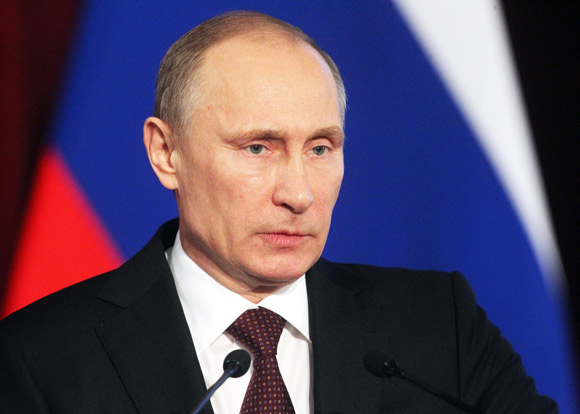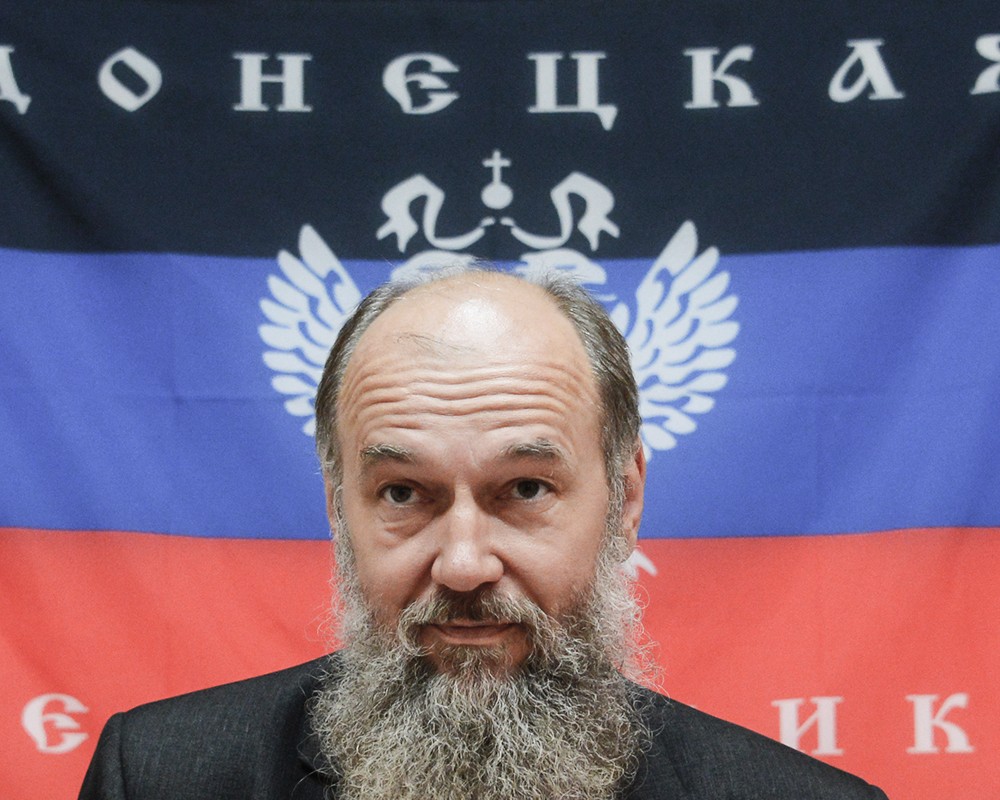The Kremlin is not willing to continue negotiations on the Donbas peace resolution in the Normandy Four format any time soon. The last meeting of the leaders of Ukraine, Russia, Germany, and France that occurred in Paris in early December 2019 after a two-year-long pause resulted in two prisoner exchanges. And now the negotiations have stalled again since Russia is not going to withdraw its troops from the occupied Donbas region and Ukraine can't accept any Russia's demands that threaten its independence.
Chairing a video-conference of the permanent members of the Russian Security Council, President Vladimir Putin expressed “disappointment over the lack of movement to resolve the crisis in Ukraine. Kyiv is not complying with either the Minsk or the Normandy agreements” (TASS, July 10). Putin made this statement in the wake of the July 8, 2020, session of the Minsk Contact Group and Kyiv’s reinterpretations of the 2015 Minsk “agreements” (see below).
Putin’s envoy for conflict-management in Ukraine, Dmitry Kozak, has already declared a unilateral Russian “pause” in the Normandy negotiation process (Germany, France, Russia, Ukraine), pending “clarifications to Ukraine’s positions” to Moscow’s satisfaction (TASS, July 4; see EDM, July 9). Kozak declared the pause following the July 3 meeting of the Normandy group’s top diplomatic advisors in Berlin, where the Ukrainian delegation defended its recent reinterpretations of the political clauses of the Minsk “agreements.”
That Normandy meeting, however, did agree on a set of ceasefire-related measures, recommending them to the Minsk Contact Group for discussion and decisions. Following the Contact Group’s July 8 session, Kozak accused Ukraine of repudiating the agreements just made at the Berlin meeting. Kozak cast the blame on Ukraine in a written demarche to his German and French counterparts in the Normandy process (TASS, July 10).
In follow-up statements, Kozak enumerates Ukraine’s current alleged deviations from the letter of the 2014 and 2015 Minsk “agreements.” To wit: Kyiv refuses negotiations with the Donetsk-Luhansk authorities; it would not enshrine a “special status” for that territory in Ukraine’s constitution; it rules out any special modalities apart from Ukraine’s legal framework for “elections” in that territory; and it would not consent to the holding of “elections” there until Russian forces withdraw, local proxy troops are disbanded, and Ukraine regains control of its side of the Ukraine-Russia border in that territory.
According to Kozak, those Ukrainian “red lines” contravene the Minsk agreements’ own inviolable “red lines.” On this basis, Kozak is explicitly asking Ukraine’s president and government to retract Kyiv’s recent statements about reinterpreting the Minsk “agreements.” Any further confirmation of those revisions, or failure to retract them, Kozak warns, would signify Ukraine’s withdrawal from the Minsk “agreements” and from the Normandy and Contact Group formats (TASS, July 9, 10).
Petro Poroshenko’s presidency and the Ukrainian parliament of the 2014–2019 period revised the Minsk “agreements” comprehensively and unilaterally, in line with Ukraine’s interests. Those revisions are codified in the 2018 “Law on the specifics of state policy to ensure Ukraine’s sovereignty on the temporarily occupied territories in the Donetsk and Luhansk regions,” also known as the “Donbas Reintegration Law” (Ukrinform, February 20, 2018). That legislation makes it unlawful for any Ukrainian authorities to negotiate with Russia’s proxies in Donetsk-Luhansk, to consent to “elections” being held there in the presence of Russian and proxy forces, or to enshrine a permanent “special status” for that territory in Ukraine’s constitution. Although unilateral (unrecognized by the other parties to the Normandy and the Contact Group formats), this legislation amounts to a protective legal shield against major concessions to Russia, defined as the “aggressor and occupying power.” Such concessions became unlawful in Ukraine under this legislation.
The Volodymyr Zelenskyy administration’s reinterpretations or revisions of the Minsk “agreements” go in the same direction as the 2018 legislation. President Zelenskyy’s team could have used that legislation as a basis for its own negotiating positions. It could have argued that Ukraine’s 2018 legislation currently in force precludes the concessions that Moscow demands from Kyiv, and it could have proceeded from that basis to further develop its negotiating positions. Instead of availing itself of that legal defensive shield, however, Zelenskyy demonstratively ignores it while persecuting the former president.
Hence, Moscow’s latest attempts at countering Kyiv’s “red lines” by invoking the Minsk agreements’ own “red lines” of supposedly overriding value. Moreover, Kozak as well as the Kremlin’s spokesperson, Dmitry Peskov (TASS, July 12), feel confident that Berlin and Paris would not countenance Kyiv’s exit from the Minsk “agreements.” Aware of the German and French political investment in the Normandy and Minsk Contact Group processes, Moscow now threatens to scuttle both processes over Ukraine’s non-compliance with the agreements. These warnings are designed to goad Berlin and Paris into pressuring Kyiv to comply with the Normandy summit documents because those documents themselves reflect Moscow’s objectives.
The Kremlin is also targeting Kyiv’s most vulnerable point at this time—namely, Zelenskyy’s and his chief of staff Andriy Yermak’s arduous pursuit of another summit opportunity for the Ukrainian head of state. In particular, Yermak tries from time to time to negotiate some of the “red lines” away in exchange for bringing his president to the stage of a Normandy summit.
Any further Normandy summit, however, is conditional on Ukraine’s fulfillment of the December 2019 Paris summit’s decisions. The follow-up summit was tentatively envisaged to be held in Berlin in April 2020. Hoping to smooth the way, Yermak accepted Kozak’s project in March to reformat the Minsk Contact Group by creating a “consultative council” with Russia’s Donetsk-Luhansk proxies (see EDM, March 26). This was to have been the price of Zelenskyy’s ticket to the April summit; just as Yermak’s acceptance of the Steinmeier Formula in October 2019 was part of the admission price for the December Paris summit (see EDM, October 3, December 11, 12, 2019).
Ukrainian civil society, however, blocked the “consultative council” project; and no further date for a Normandy summit is anywhere in sight. Russia holds Ukraine to be noncompliant, not only with the Minsk “agreements” (a bilateral Russia-Ukraine matter) but also with the December 2019 Normandy summit’s decisions, whereby Moscow, Berlin and Paris jointly require Ukraine to introduce the Steinmeier Formula into Ukraine’s law on a special status for the Russian-occupied territory. That formula would conclusively break the conditional linkage (tenuous in the first place) between the quality of “elections” in Donetsk-Luhansk and the eligibility of those local authorities for a “special status.”
Read also:
- Kyiv finds an alibi to step back from Kozak-Yermak plan on Donbas
- Shady agreements legitimizing Russia's puppet “republics"
- Russia’s policies toward Ukraine remain unchanged month after Kremlin’s “gray cardinal” replaced
- Kozak-Yermak plan on Donbas: The fine print
- Portnikov: Next Normandy Four summit won't be soon
- Zelenskyy's first Normandy and the illusion of progress
- Ukrainian and Russian positions at Normandy Four talks in Paris
- “Ukrainian Doctrine of Security and Peace” proposed as alternative plan to Minsk protocol
- On eve of Normandy summit, most Ukrainians reject peace at any price
- Why negotiate? Expectations for the Normandy Four meeting
- Who is who in the Minsk process (2017)
- Everything you wanted to know about the Minsk peace deal





